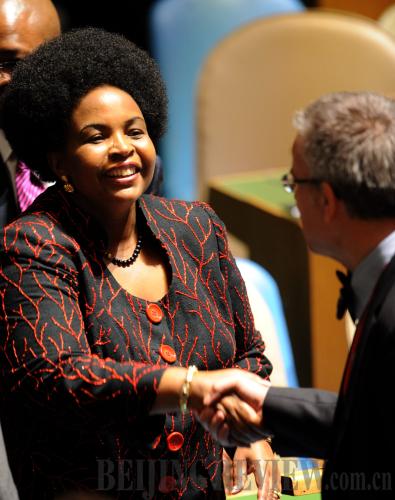|
Obstacles
 |
|
SHARING THE JOY: South Africa's Minister of International Relations and Cooperation Maite Nkoana-Mashabane (left) receives congratulations after South Africa won a non-permanent seat on the UN Security Council on October 12, 2010 (SHEN HONG) |
The reform of the UN Security Council is an extremely complex issue. As intergovernmental negotiations focus more on core problems after five rounds of negotiations, differences still outweigh consensus—making prospects for agreement not very bright.
Fierce competition will be inevitable during the reform of the Security Council. The number of members and veto power are the key issues of the reform. These matters touch on the redistribution of power in the most prestigious organization of the international system. It is a matter of status and dignity for a country. What the members are competing for are strategic resources. Therefore, it has obvious features of a zero-sum game. One country's gain is another country's loss. That's why it is difficult to reach a compromise.
Moreover, the reform is being used as a bargaining chip by major countries to achieve its strategic interests. This situation means that reform of the UN Security Council will be very hard to accomplish.
Structural problems in the international system make the reform even more difficult. Regarding the UN Security Council reform, countries can be divided into four groups according to their stance on this issue—radicals, conservatives, moderates and promoters. Among them, the radicals are the focus of the dispute.
Radicals consist of two types of countries. The first type comprises developed countries that were defeated in World War II and subsequently became economically and politically strong. Japan and Germany belong to this group. They are eager to reform the current international system and thoroughly get rid of their historical burden by becoming permanent members of the UN Security Council. The second type comprises emerging countries, such as India and Brazil. They are political radicals in international relations. They are eager to increase their political power and status by becoming Security Council permanent members. It is only natural that these two groups have worked together to achieve their shared goal. But the countries' radical actions have hindered their progress.
Of the five permanent members, all of which support the reform, Britain and France are relatively more active. But as countries with vested interests, they are also subject to the impact of any reform. In addition, they have their own problems and concerns. Therefore, they have adopted a conservative stance regarding the reform.
Some other countries are at a relative disadvantage as they compete for permanent seats. However, they don't want to see their regional competitors win. They also hope to have an opportunity to get permanent seats. Their policies are quite moderate, and they have formed the Uniting for Consensus movement to restrain radical countries.
Some UN agencies and nongovernmental organizations form the fourth group—the promoters—based on their desire to maintain and promote multilateralism.
| 